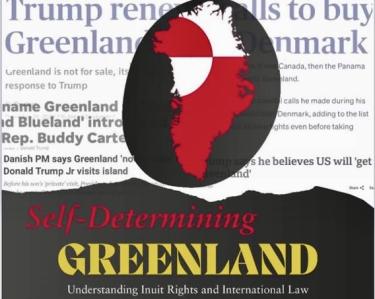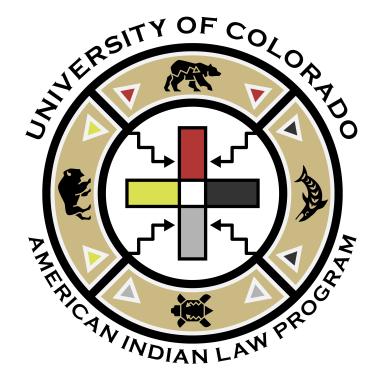“Self-Determining Greenland”: A Discussion on Inuit Rights and International Law at the University of Colorado Law School
The American Indian Law Program (AILP) at the University of Colorado Law School hosted a hybrid panel discussion entitled “Self-Determining Greenland: Understanding Inuit Rights and International Law,” on February 24, 2025.

Design by Hannah Ahders '25
The event came in the wake of comments made by President Trump about his interest in the United States acquiring the island nation of Greenland from Denmark on January 7, 2025, mirroring similar statements made by the President in 2019. Following questions from students and the public, the AILP prepared a background document on the situation in Greenland, and convened several experts for discussion.
Featured speakers were Sara Olsvig, Chair of the Inuit Circumpolar Council, joining from Greenland; Naja Dyrendom Graugaard, Associate Professor at the University of Copenhagen, joining from Denmark; and S. James Anaya, Professor at the University of Colorado Law School, joining from the United States. Professor Anaya previously served as United Nations Special Rapporteur on the Rights of Indigenous Peoples.
Ms. Olsvig provided background on Greenland. Known as “Kalaallit Nunaat” in the Inuit language, Greenland is a country where approximately 90% of the population is Inuit. Dating back to 1979, the Parliament of Greenland (or Inatsisarut) has served as the primary political body that makes decisions regarding the land, citizens, language, and resources of Kalaallit Nunaat. In 2009, the Self-Government Act recognized that the people of Greenland are a people with the right to self-determination under international law. The Act also outlined the process by which Kalaallit Nunaat could seek independence from Denmark. On March 31, 2023, a constitutional commission produced a draft constitution for an independent Kalaallit Nunaat.

AILP Logo by Adam Youngbear
Ms. Olsvig indicated that in Kalaallit Nunaat, the salient question is not whether a new colonizing power would be preferable to the current one, but rather which actions best empower the Greenlandic people to exercise self-government following centuries of colonization by Denmark.
Associate Professor Graugaard discussed systemic discrimination faced by Inuit people, both in Kalaallit Nunaat and in Denmark, including the forced sterilization of Inuit women by Danish authorities, as well as the removal of Inuit children from their families. She also emphasized the need to consider the value of rare minerals, such as cryolite or “white gold,” that have long been extracted from Greenland for the benefit of Denmark’s institutions, companies, and citizens.
Professor Anaya outlined relevant frameworks under the international law of self-determination. The “decolonization” framework provides peoples of formally colonized territories to freely establish independent statehood or other arrangements. The decolonization framework was applied to Kalaallit Nunaat under United Nations procedures, which were discontinued after Denmark in 1953 incorporated Kalaallit Nunaat as a province. That incorporation, however, was not clearly the result of the freely expressed will of the people of Kalaallit Nunaat, and thus the people Kalaallit Nunaat are entitled to choose independence or other arrangement. Also applicable is the Indigenous Peoples’ framework, under which the Inuit people in Kalaallit Nunaat are entitled to pursue self-determination. Ordinarily, under the Indigenous Peoples framework, self-determination is to be exercised within a nation-state. Either framework could give rise to a number of legal structures and political arrangements.
Audience members raised issues of Inuit language, culture, and identity. Several participants located the current issues within a broader context of political, military, and economic interests in the Arctic region. Inupiaq participants from Alaska voiced support for the Inuit of Kalaallit Nunaat.
The panel was moderated by AILP Director and Professor Carpenter, and AILP Fellow Emiliano Salazar ’23. Professor Carpenter noted that “it is important for the American Indian Law Program at Colorado Law to elevate the voices of Indigenous Peoples and help to educate the public about the laws and policies affecting them.” For more information about the AILP, please visit our website.


